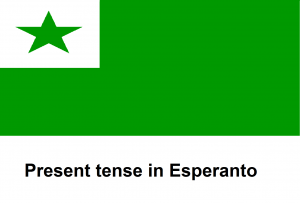Difference between revisions of "Language/Esperanto/Grammar/Present-Tense"
Jump to navigation
Jump to search
(Present tense in Esperanto) |
|||
| Line 1: | Line 1: | ||
[[File:Present tense in Esperanto.png|alt=Present tense in Esperanto|thumb|Present tense in Esperanto]] | |||
. | |||
Hello everybody, | |||
In today's lesson you will learn some useful vocabulary about '''¨PRESENT TENSE¨''' in Esperanto. | |||
Feel free to edit this page by adding new words and expressions ! | |||
Good learning ! :) | |||
. | |||
. | |||
== '''Some explanation for Past tense in Esperanto'''[edit|edit source] == | |||
'''<big>OBS.: In the infinitive form; change the last letter (-i) by (-is) to form the Past Tense</big>''' | |||
{| class="wikitable sortable" | |||
!<big>'''ENGLISH'''</big> | |||
!<big>'''PRONUNCIATION'''</big> | |||
'''<big>ENGLISH</big>''' | |||
!'''<big>ESPERANTO</big>''' | |||
!'''<big>PRONUNCIATION</big>''' | |||
'''<big>BRAZILIAN</big>''' | |||
'''<big>PORTUGUESE</big>''' | |||
!'''<big>BRAZILIAN</big>''' | |||
'''<big>PORTUGUESE</big>''' | |||
|- | |||
| | |||
| | |||
| | |||
| | |||
| | |||
|- | |||
|to have | |||
|'''''hah vih''''' | |||
|'''<big>havi</big>''' | |||
| | |||
|ter | |||
|- | |||
| | |||
| | |||
| | |||
| | |||
| | |||
|- | |||
|I had | |||
|'''''mih hav vihs''''' | |||
|'''<big>Mi havis</big>''' | |||
|'''''mi Ha vis''''' | |||
|Eu tinha | |||
|- | |||
|You had | |||
|'''''vih hav vihs''''' | |||
|'''<big>Vi havis</big>''' | |||
|'''''vi Ha vis''''' | |||
|Você tinha | |||
|- | |||
|He had | |||
|'''''lih hav vihs''''' | |||
|'''<big>Li havis</big>''' | |||
|'''''li Ha vis''''' | |||
|Ele tinha | |||
|- | |||
|She had | |||
|'''''shih hav vihs''''' | |||
|'''<big>Ŝi havis</big>''' | |||
|'''''chi Ha vis''''' | |||
|Ela teve | |||
|- | |||
|We had | |||
|'''''nih hav vihs''''' | |||
|'''<big>Ni havis</big>''' | |||
|'''''ni Ha vis''''' | |||
|Nós tínhamos | |||
|- | |||
|You had | |||
|'''''vih hav vihs''''' | |||
|'''<big>Vi havis</big>''' | |||
|'''''vi Ha vis''''' | |||
|Vocês tinham | |||
|- | |||
|They had | |||
|'''''ih lih hav vihs''''' | |||
|'''<big>Ili havis</big>''' | |||
|'''''ili Ha vis''''' | |||
|Eles tinham | |||
|- | |||
| | |||
| | |||
| | |||
| | |||
| | |||
|- | |||
|I came | |||
|'''''mih veh nihs''''' | |||
|'''<big>Mi venis</big>''' | |||
|'''''mi ve nis''''' | |||
|Eu vim | |||
|- | |||
|I ate an egg | |||
|'''''mih mahn jihs oh vohn''''' | |||
|'''<big>Mi manĝis ovon</big>''' | |||
|'''''mi man djis o von''''' | |||
|Eu comi um ovo | |||
|} | |||
In Esperanto, expressing present tense is changing the "-i" of a verb to "-as". | In Esperanto, expressing present tense is changing the "-i" of a verb to "-as". | ||
*I come. - Mi venas. | *I come. - Mi venas. | ||
*I eat an egg - Mi manĝas ovon. | *I eat an egg - Mi manĝas ovon. | ||
Revision as of 03:23, 10 April 2020
.
Hello everybody,
In today's lesson you will learn some useful vocabulary about ¨PRESENT TENSE¨ in Esperanto.
Feel free to edit this page by adding new words and expressions !
Good learning ! :)
.
.
Some explanation for Past tense in Esperanto[edit|edit source]
OBS.: In the infinitive form; change the last letter (-i) by (-is) to form the Past Tense
| ENGLISH | PRONUNCIATION
ENGLISH |
ESPERANTO | PRONUNCIATION
BRAZILIAN PORTUGUESE |
BRAZILIAN
PORTUGUESE |
|---|---|---|---|---|
| to have | hah vih | havi | ter | |
| I had | mih hav vihs | Mi havis | mi Ha vis | Eu tinha |
| You had | vih hav vihs | Vi havis | vi Ha vis | Você tinha |
| He had | lih hav vihs | Li havis | li Ha vis | Ele tinha |
| She had | shih hav vihs | Ŝi havis | chi Ha vis | Ela teve |
| We had | nih hav vihs | Ni havis | ni Ha vis | Nós tínhamos |
| You had | vih hav vihs | Vi havis | vi Ha vis | Vocês tinham |
| They had | ih lih hav vihs | Ili havis | ili Ha vis | Eles tinham |
| I came | mih veh nihs | Mi venis | mi ve nis | Eu vim |
| I ate an egg | mih mahn jihs oh vohn | Mi manĝis ovon | mi man djis o von | Eu comi um ovo |
In Esperanto, expressing present tense is changing the "-i" of a verb to "-as".
- I come. - Mi venas.
- I eat an egg - Mi manĝas ovon.
